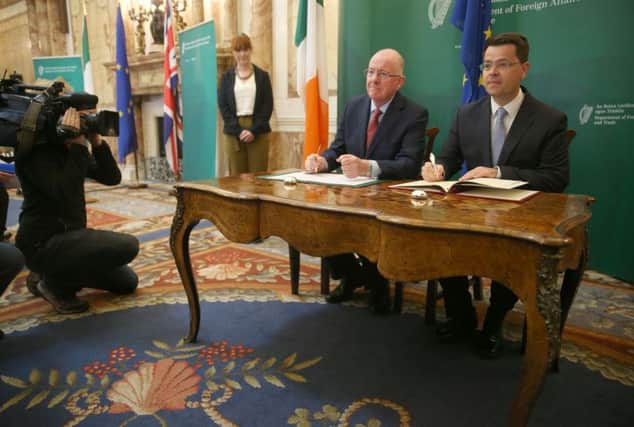Secretary of State's pledge to smash paramilitaries as treaty is signed


Just weeks into the job, the Conservative minister has delivered his most hard-hitting rebuke to date on those still engaged in loyalist and republican violence.
Signing an international treaty with Dublin to set up a new paramilitary watchdog, Mr Brokenshire warned he was intent on putting more of them behind bars and out of business.
“I am determined to make progress,” he said.
Advertisement
Hide AdAdvertisement
Hide Ad“We cannot tolerate cold-blooded murder in alleyways masquerading as justice.
“It has to stop and these groups must be put out of business for good.”
Mr Brokenshire and Irish foreign affairs minister Charlie Flanagan both signed an accord in Dublin which paves the way for the setting up of the Independent Reporting Commission (IRC).
Jointly formed by the UK and Irish governments, it was one of the measures agreed in last year’s Fresh Start Agreement between the two governments and Stormont leaders.
Advertisement
Hide AdAdvertisement
Hide AdConfirming a £3 million war-chest for the new watchdog, Mr Brokenshire said he hopes it plays a “key role in confronting the scourge of paramilitarism” that still affects people in Northern Ireland.
“Those engaged in what is often described as paramilitary activity serve no political cause,” he said after signing the treaty at Iveagh House in central Dublin.
“They commit crime using the cloak of paramilitarism to line their own pockets.
“They use intimidation and fear to exert power and influence within their communities.
Advertisement
Hide AdAdvertisement
Hide Ad“They hold communities back - deterring investment and jobs and preventing people from moving on with their lives.”
Mr Brokenshire said he will work with Dublin and Belfast to stop young people joining loyalist and republican groups and help communities stand up to them.
Furthermore, he vowed to get more people coming forward giving evidence and to ensure the criminal justice system prosecutes more paramilitary figures, putting “more of them behind bars for longer”.
“There should rightly be high expectations of what we seek to achieve,” he said.
Advertisement
Hide AdAdvertisement
Hide AdMr Flanagan said while paramilitary murders were now infrequent compared with recent decades, communities are still being targeted.
“Under the radar, some communities in Northern Ireland remain subject to daily intimidation, bullying and indeed control by thugs and criminals,” he said.
“This is not acceptable in any society.”
Mr Flanagan said the treaty setting up the IRC provided a framework for ending paramilitary activity.
Legislation being introduced this week in the House of Commons and later in the Irish parliament, the Dail, is expected to see the IRC up and running by the end of the year.
Advertisement
Hide AdAdvertisement
Hide AdIts annual reports will be published by the UK and Irish governments, which are also entitled under the terms of the treaty to jointly request further reports as required.
The commission may make recommendations to the Northern Ireland Executive to inform future Programme for Government priorities and commitments.
The IRC will have four members, including persons of “international standing”.
The UK and Irish governments will nominate one member each; the Northern Ireland Executive two members.
ends
↑ Top of page